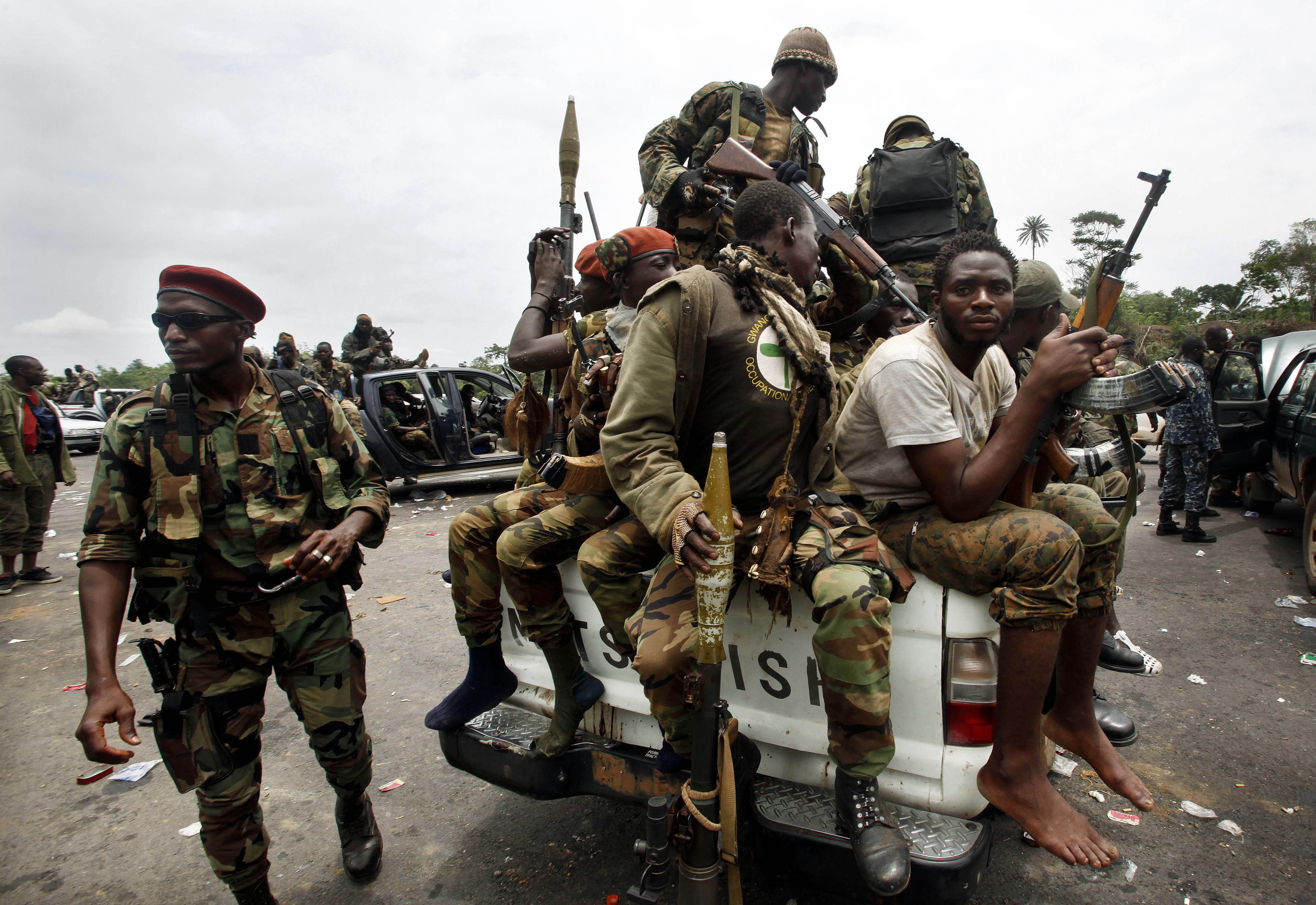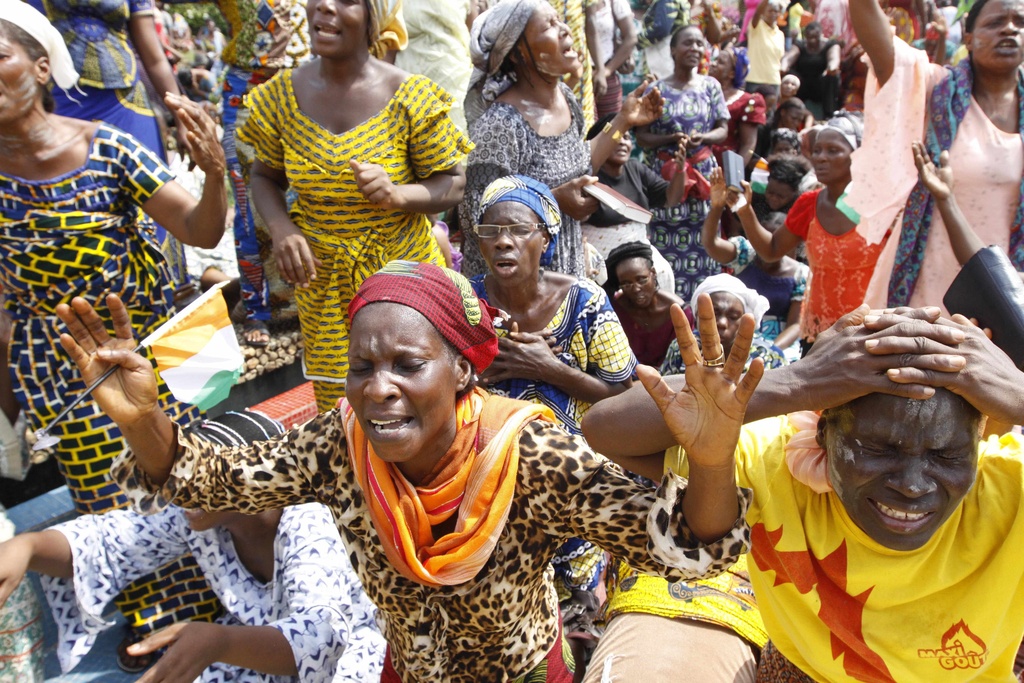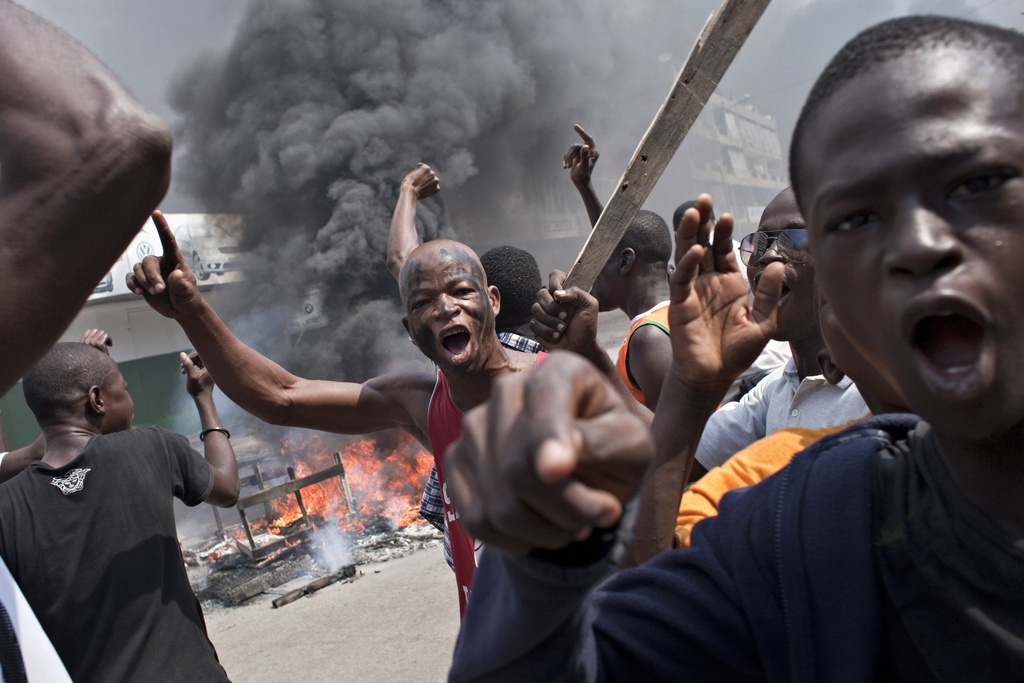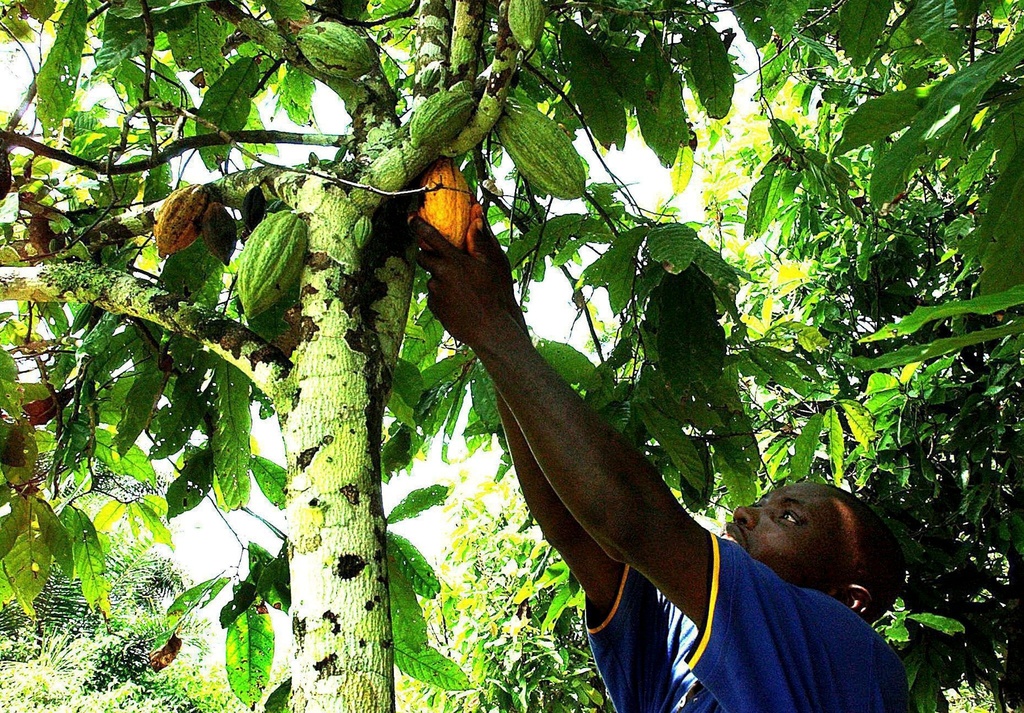“There are four bodies outside our house”

Swiss citizens in the Ivory Coast city of Abidjan have told swissinfo.ch how they are coping with the violence that has now reached the country’s economic capital.
Tension is rising as the forces of the elected president, Alassane Ouattara, are poised to force his rival, Laurent Gbagbo, to step down.
Reports say United Nations and French forces are preparing to attack the presidential palace on Tuesday after launching full assaults on the residence of the entrenched leader, the republican guard, two major military bases and state television.
The violence is not only between the factions, but possibly also from criminal gangs, the Swiss embassy said on its website on Monday. People should stock up with essentials and be prepared for every eventuality.
Swiss citizens are advised to leave the country, and to inform the embassy if they do so. Meanwhile they should follow the news on the radio and keep away from crowds. Any curfews should be strictly obeyed.
Jean-Paul – who didn’t want to be identified further – has an Ivorian partner and a baby daughter. He is trying to set up a business importing affordable pre-fabricated villas, but while the violence continues everything is on hold.
“I’ve been lucky so far. For the last four days I’ve been listening to bullets whistling around the building,” he said on Monday.
But he feels he has no choice but to leave if he can – “jumping into a tank as it goes past”, as he put it. He thinks his partner will be safe staying on, keeping the baby, who is very white, well hidden, and he will send money from Switzerland until he can return and pick up his business again.
Not that getting out is easy: he has been trying to contact the United Nations forces to see what he should do, but he has found himself passed from pillar to post. Now the credit on his mobile phone is almost used up, and there is no way to top it up.
Propaganda war
The pro-Gbagbo radio station is broadcasting anti-French propaganda, and being Swiss rather than French is no protection against a gun-toting militiaman at a road block. Jean-Paul is obliged to stay inside; it is his partner who has to try to go shopping. But things are not safe for locals either.
“She puts her hands up at every road block – and there’s one every 100 metres. There are four bodies lying outside our house now. No-one’s going to come and pick them up.”
The road blocks change hands, and there is shooting all around, he said. He believes that Ouattara’s troops have been led into a trap: they advanced quickly towards the presidential palace, without mopping up the streets as they went. Now Gbagbo supporters are collecting weapons from various caches and closing in behind the Ouattara forces.
He says high levels of illiteracy mean many people have no access to real news, and are convinced by Gbagbo’s propaganda, that he has no money except his presidential salary and no hidden bank accounts abroad.
“They will die for him, because they believe all the nonsense that’s been hammered into them.”
Curfews and cuts
Things are calmer in the part of town where Joël Sommer has been living since last August. He works for the Swiss branch of SIM (Serving in Mission), training pastors, while his wife Marianne is a teacher.
He knows the city well, since he lived there for seven years in the 1990s.
Life is certainly not normal, even in the area where the Sommers live, which has an entrance gate that is always guarded, he reported on Monday.
On Sunday night there was curfew until 6 am, Sommers said, adding that the water supply is cut off during the day time, although it runs for a few hours overnight. Everyone fills all their available containers when they can. Two days ago there was a 12-hour power cut. Now it’s back – but for how long?
As for the atmosphere on the streets , he described it as “suspiciously quiet”. But he added that it could change at any time.
“The embassy rang yesterday and told us not to go onto the streets alone. They said the French might come and fetch us, so we should stay at home. I think that our state of mind is now such that we would go,” he told swissinfo.ch.
A time of uncertainty
So for the Sommers, it is a time of waiting.
“We don’t know when the embassy will phone and when we shall have to take a decision. At the moment they are saying: ‘Wait, sit still, don’t go out much.’”
Sommer dreads having to take that decision. “If you go, you don’t know when you will come back, or if you will come back – that makes it difficult emotionally.”
They have not yet packed their suitcases, but are thinking about it. But they don’t know what they will be able to take.
Meanwhile, they have stocked up on food, with supplies they hope will last at least a week. They pass the time wondering whether they can buy anything, whether there are any shops open close enough for them to get to. They talk to the neighbours and phone friends, exchanging information.
On Monday one small nearby shop was indeed open, but there was a long, long queue. “I guess it will be empty by the evening,” Sommer commented.
“If I said I was not afraid, I would be lying,” he said. And his African friends are naturally depressed and afraid too.
“We don’t know what will happen. Everyone wants peace and stability. We don’t know how it will turn out.”
The International Committee of the Red Cross (ICRC) is active in Ivory Coast at present.
The number of its staff, both expatriate and foreign, is being increased because of the current conflict, to around 300, spokesman Steven Anderson told swissinfo.ch.
The Red Cross is generally well known and respected in Ivory Coast, he said.
“We are one of the few humanitarian organisations that can actually work inside the country and we are really committed to continue doing so, particularly now as there are such huge needs.”
The very “volatile” security situation in Abidjan has hampered its work there in the last few days.
However, elsewhere in the country the ICRC is more able to move about.
It is helping displaced people, and helping to provide water and sanitation and medical help.
Nevertheless, before staff go out they monitor the security situation, and do not go if they feel it is not safe.
The second round of the 2010 presidential election in Ivory Coast pitted the incumbent, Laurent Gbagbo, favoured in the south, was pitted against Alassane Ouattara, who enjoys support in the north.
Provisional results released by the Independent Electoral Commission on December 2 gave Ouattara 54% of the vote.
However, the President of the Constitutional Council declared the results invalid and announced that Gbagbo had won with 51.5%.
Both men subsequently took an oath of office.
Ouattara’s election was recognised by the international community, but Gbagbo refused to step down.
Hundreds of people were reported killed in post-election violence, and thousands fled to neighbouring countries.
Since then there has been a stand-off with a number of clashes.
The African Union gave Gbagbo until March 24 to step down, but he did not comply.
Pro-Ouattara forces then started to move down from their northern bases towards Abidjan.
Both sides are accused of killing civilians indiscriminately.

In compliance with the JTI standards
More: SWI swissinfo.ch certified by the Journalism Trust Initiative



You can find an overview of ongoing debates with our journalists here. Please join us!
If you want to start a conversation about a topic raised in this article or want to report factual errors, email us at english@swissinfo.ch.